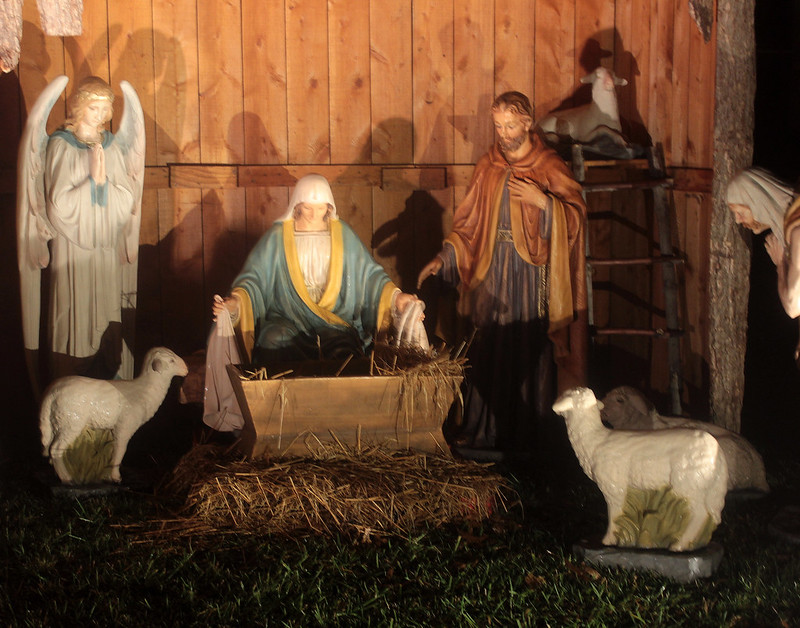|
How far would you travel and how much difficulty would you endure if you were really hungry and knew you could receive bread from a certain place? Our nation is living through hard times caused by the plague called Covid. Many are sick and finding themselves living in poverty from the ramifications of this virus. On the nightly news we see people in cars lined up for hours as they wait for a bag of groceries.
Through the centuries many populations have gone through times of hunger—both physical and spiritual. The prophet Amos talked about a day when "a famine of hearing the words of the Lord" would come. (Amos 8:11) When people find themselves without something they are used to or need they begin searching for a way to obtain it. Scripture is full of stories of individuals who were set on going to a place whose name means "House of Bread" or Bethlehem. Their journeys were directly connected to the life of Jesus--"The Living Word," "The Bread of Life," "The Redeemer." The prophet Micah prophesied about the significance of Bethlehem: "But you, Bethlehem Ephrathah, though you are small among the clans of Judah, out of you will come for me one who will be ruler over Israel, whose origins are from old, from ancient times." (Micah 5:2) The tribe of Judah received Bethlehem in their inheritance from the Promised Land. After they became established in this territory, there was a time of famine. The family of Elimelech and Naomi left Bethlehem and moved to Moab so that they could get food. Their sons married Moabite women while there. After 10 years in Moab, all the men died, leaving their women as widows. Naomi's daughter-in-law, Ruth, insisted on staying by her mother-in-law's side even though Naomi was returning to Bethlehem. Ruth told her, "Where you go, I will go, and where you stay, I will stay. Your people will be my people and your God my God." (Ruth 1:16) They arrived in Bethlehem during the barley harvest. Because Ruth was willing to make the journey, there was a new life waiting for her, filled with promise. She was noticed by Boaz from the clan of Elimelech as she gleaned in his field. Boaz became her husband, and she became part of the genealogy of Jesus by bearing a son named Obed (Servant of Worship) to Boaz. He became the father of Jesse who was the father of King David. When God decided to appoint a new king to replace Saul, the prophet Samuel was instructed by God to go to the city of Bethlehem to anoint David as the king of Israel. David went from tending sheep to tending God's people. From David, 14 generations passed to King Jeconiah, meaning "Established of the Lord." During his reign, the Israelites were exiled to Babylon, after which 14 more generations were birthed. (See Matthew 1) At the end of that run of 14 generations Jesus was born of the virgin Mary from Nazareth. His earthly father, Joseph, was a descendant of David. When Caesar Augustus issued a decree that a census would be taken of the entire Roman empire, Joseph and Mary had to travel to Bethlehem exactly at the time when Mary gave birth to Jesus. Because there was no guest room for Joseph and Mary, Mary gave birth in a room meant for animals. She wrapped the Son of God in cloths and laid Him in a manger. (Luke 2:7) Shepherds who were tending their flocks in the fields nearby were told about the birth of a Savior in Bethlehem by an angel of the Lord. They made the trip to Bethlehem and were filled with praise and glory for God after seeing the baby laying in a manger. Magi from the east also took a long journey to Bethlehem to worship Jesus. After seeing His rising star in the sky, they followed that star to the place where Jesus was. Being overwhelmed with worship, they gave him their treasures. Much fruit came from every trip that was taken to Bethlehem. In fact, the region of Bethlehem is called Ephrathah, meaning fruitful. The trips required sacrifice however, all were rewarded. "The House of Bread" fed every visitor. During this season, I believe that we are being called to make a spiritual journey to Bethlehem. Our year has been difficult. A "famine," so to speak, has overtaken us. However, God wants to prepare us for a new season—one of blessing where we will be filled with the Bread of Life that revives us and brings us into a time of greater intimacy with the Lord. We can visit The House of Bread by calling out to the Lord and asking Him to nourish and sustain us with the Bread of His Holy Presence. We must tell Jesus we are hungry for more of Him. He is the answer to every difficulty and the source of eternal life. |
Joan E. MathiasCategories
All
Archives
July 2024
|

 RSS Feed
RSS Feed